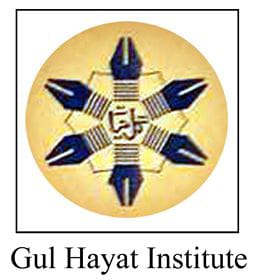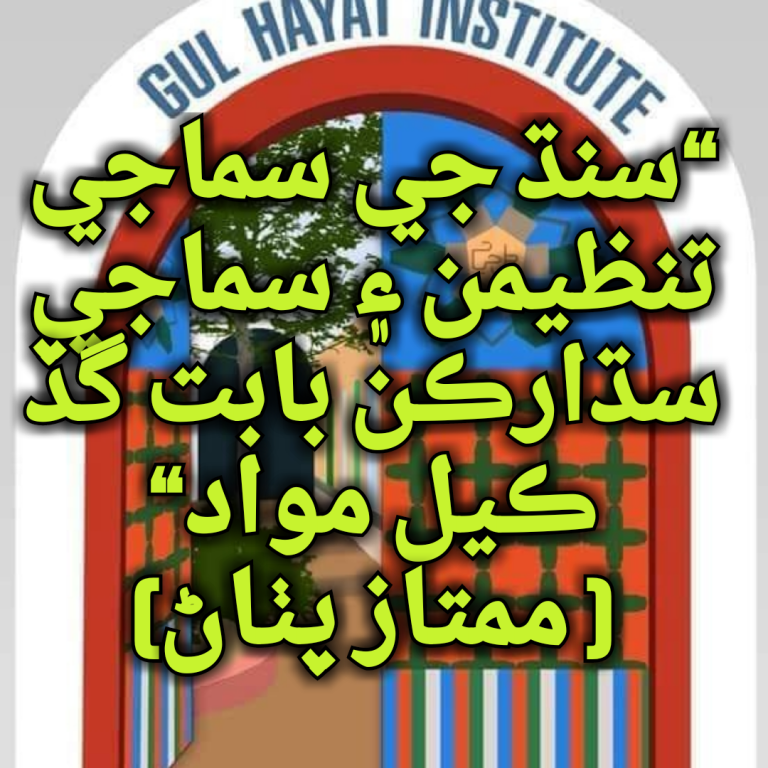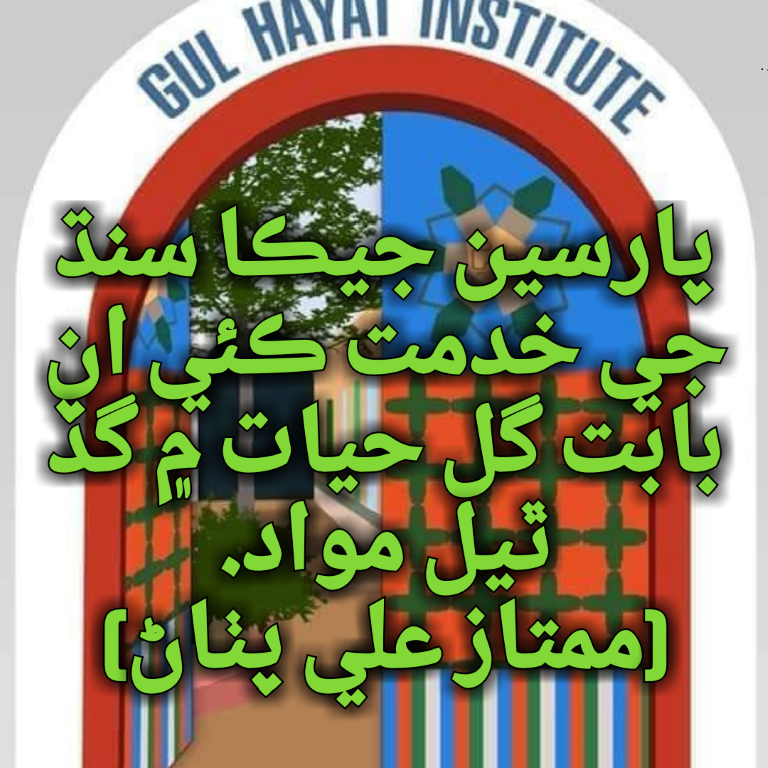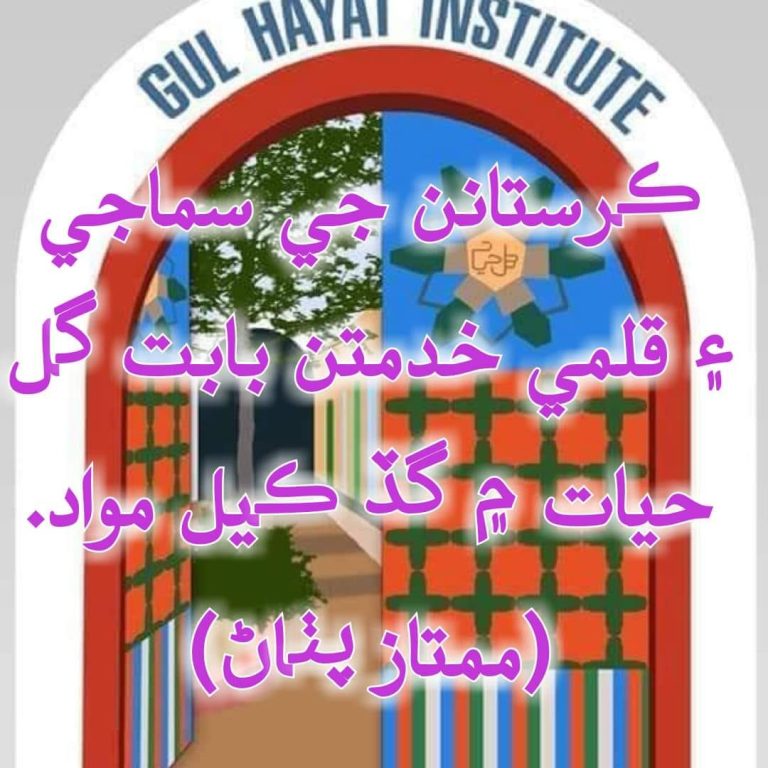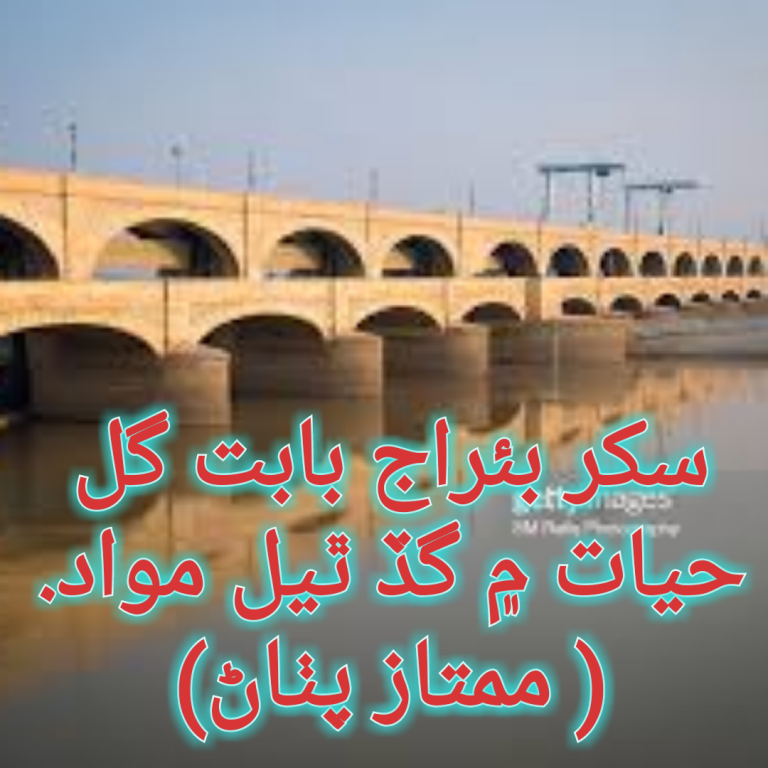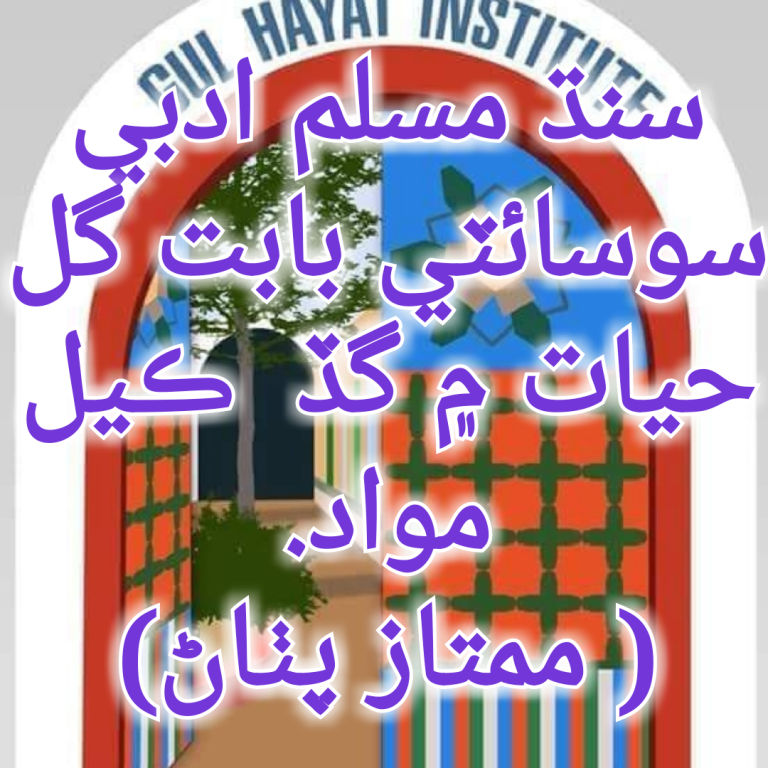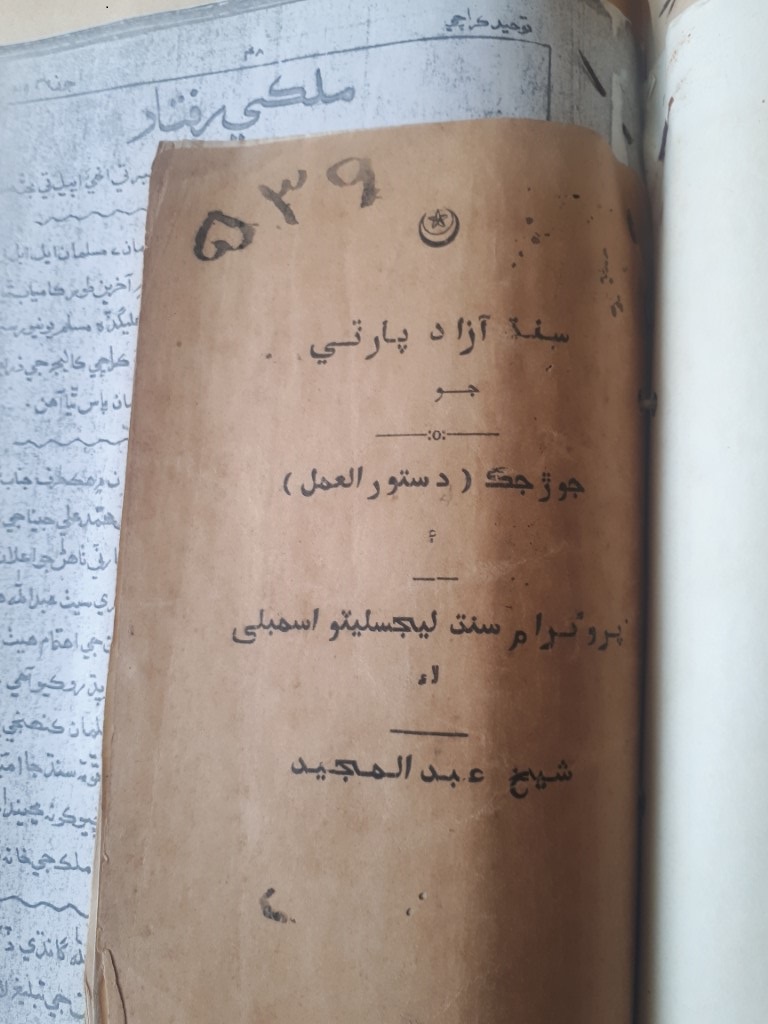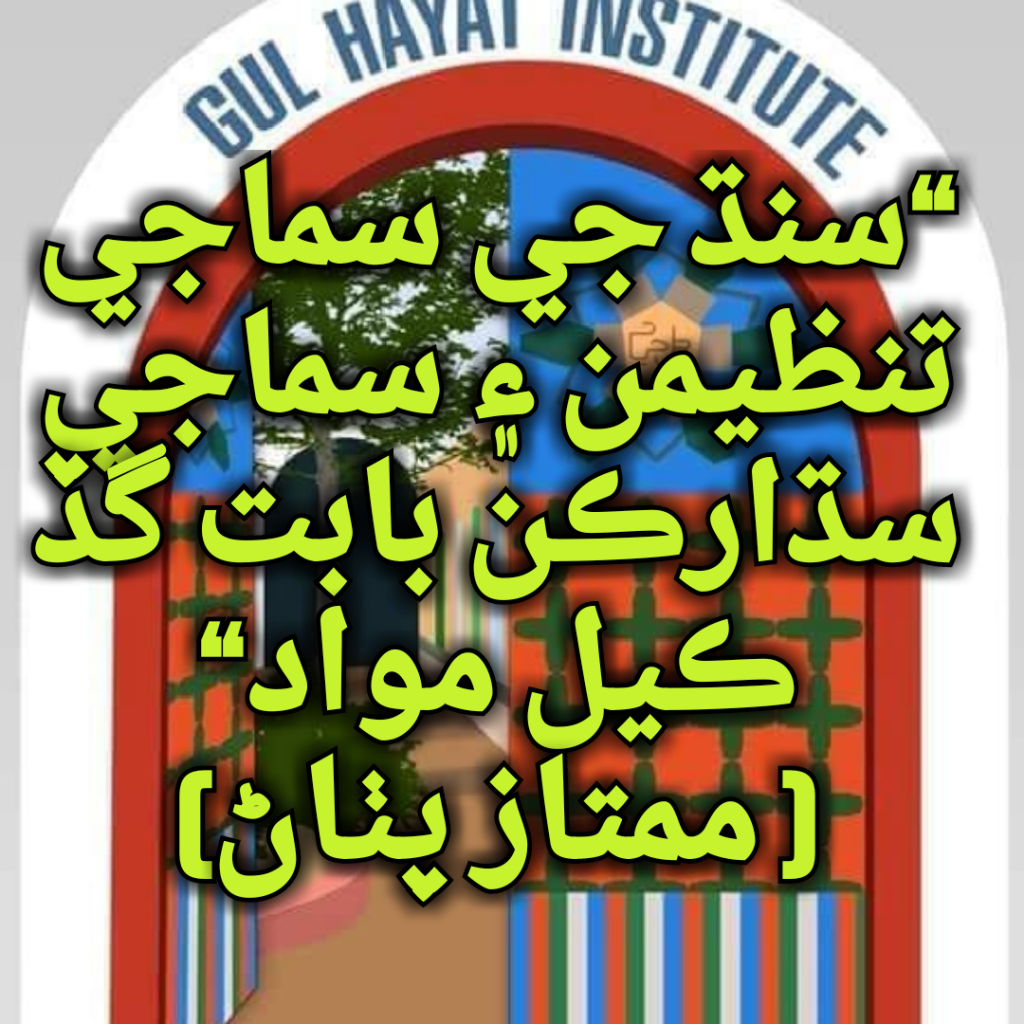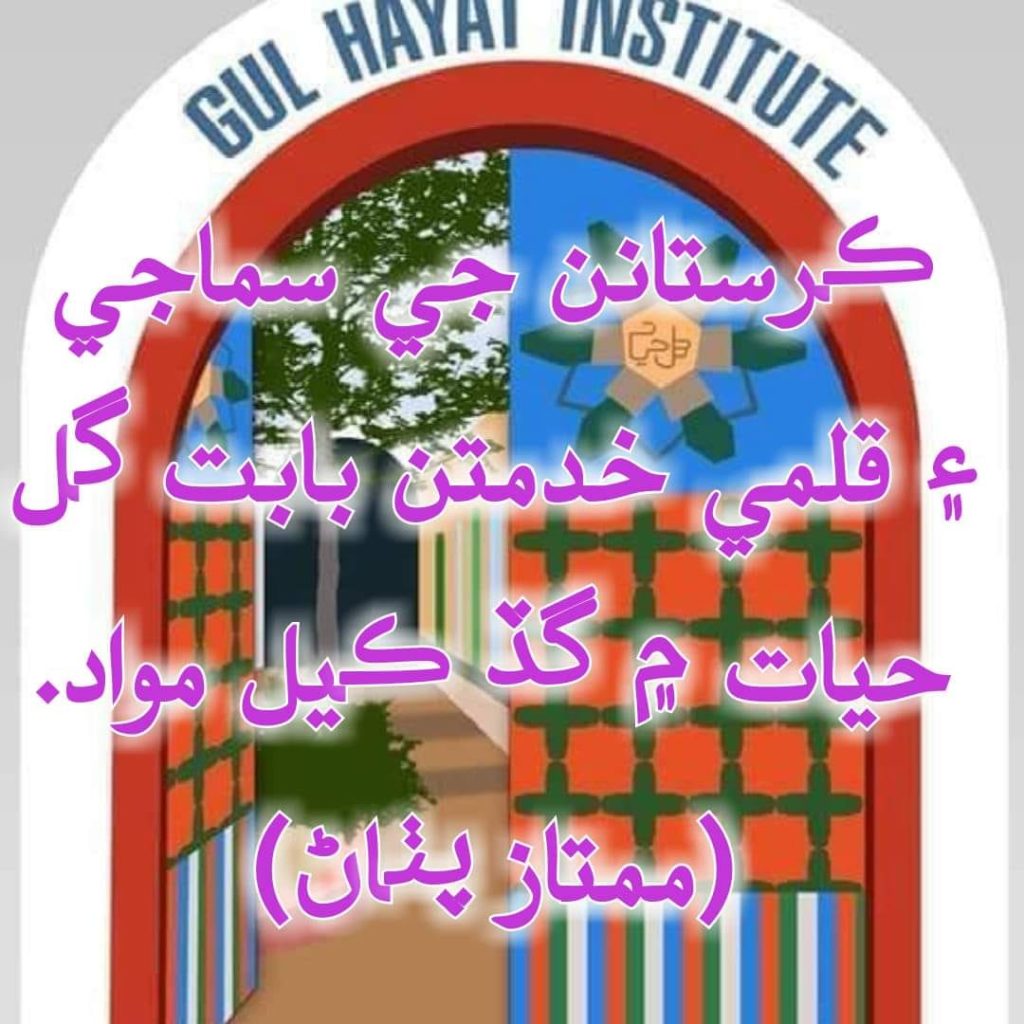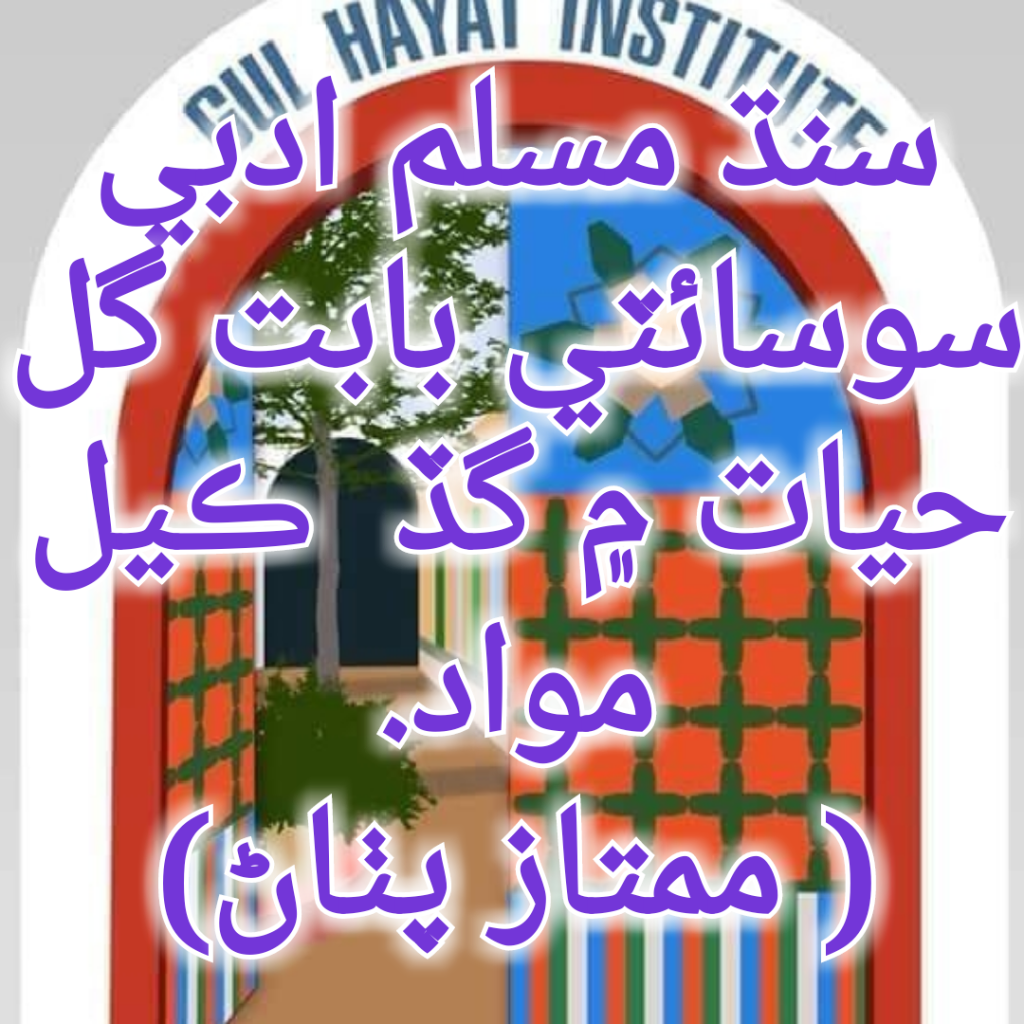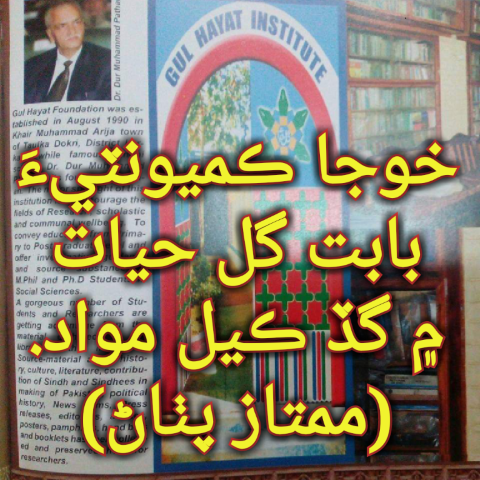FEBRUARY BIRTH DATES
1st February
1. Moulan Ahmad Malah (Kandi/Religious Scholar, Poet & Freedom Fighter/1877), 2. Muhammad Hashim Gazdar (Karachi/Politician/1895), 3. Saqib Mangi (Writer/1930), 4. Usman ‘Ajiz’ (Mehar Vesar/Poet/1934), 5. Bulchand ‘Kamal’ (Sukkur – Poorbandar/Poet/1938 ), 6. Qurban Ali ‘Saqi’ (Karondi/Poet/1940), 7. Moulana Abdul Razaq Channo (Bahawal Shah/Moulvi/1942), 8. Akhtar Shah Bukhari (Mathelo/Journalist/1947), 9. Ramesh Choudhri (Mombai/Stage Actor/1951), 10. Ghulam Sarwar ‘Saif’ (Poet/1953), 11. Sufi Muhammad Alim Shar (Rasoolpur/Poet/1953), 12. Jaat Muhammad Unis (Chunaro/Journalist/1958 ), 13. Sujag Sindhi (Poet/1958 ), 14. Hussain Bux Ridu (Sonharo/Poet/1960)
15. Abbas Kumbhar (Mehar/Writer/1960), 16. Gohar Sindhi (Rustam/1961), 17. Irshad Rahi (Poet/1962), 18. Shabir Siyal(Suleman Khero/Poet/1962), 19. Murad Baloch (Esa Baloch/Journalist/1963), 20. Manzoor Abro (Chhato Wahan/Painter/1965), 21. Khalid Faroqi (Kashmore/Poet/1966), 22. Bashir Thebo (Talpur Wada/Writer/1967), 23. Rauf Chandio (Bhanbho Chandio/Journalist/1978 ), 24. Ghulam Rasool Soomro (Shadan/Writer/1969), 25. Zulfkar ‘Parwano’ (Dubi/Poet/1971), 26. Wahid Malah (Aleem/Poet/1972), 27. Sikandar Abbasi (Moro/Writer/1974), 28. Hafiz Ahmad ‘Zaheen’ (Sobho Magsi/1975), 29. Khadim Dahote (Khairpur/Social Worker/1977), 30. Muktiar Panhwar (Daud Panhwar/ Writer/1978 )
31. Riazat Bhutto (Shikarpur/Writer/1977), 32. Azad Langah (Shikarpur/Journalist/1977), 33. Manzoor ‘Raz’ Sitai (Poet/1978 ),34. Wahab Jarwar (Khan Wahan Naudero/ Journalis & Writer/1983),35. Zahid Dahot (Khairpur/Poet/1984), 36. Ahmad Bux Soomro (Radi/Poet/1908 ), 37. Wazir Ali Soomro (Soonmiani/Writer/1941). 38. Roshan Shaikh (Pir Hajan Shah/Poet/1982), 39. Syed Akbar Shah (Dar Maluk Shah/Poet/1943)
2nd Feburary
1. Bekas (Rohri/Saint Poet/1859), 2. Kavi Sant Pahlajram ( Khahi/Saint Poet/1900), 3. Syed Ali Akbar Shah (Mehar/Freedom fighter, poet & social worker/1901), 3. Ghulam Hussain Jalbani (Scholar/1914), 4. Kazi ‘Ada’ (Larkano/Writer/1939), 5. Noor Hussain Baloch (Atal Muradani/Journalist/1942),6. Nisar Hussaini (Writer/1943), 7. Hussam Soomro (Bachal Soomro/Journalist/1944), 8. Mushtaq Arain (Digri/Journalist/1948 ), 9. Shah Muhammad ‘Shahan’ (Badah/Poet/1950), 10. Juman Hakro (Khahi/Poet/1950), 11. Kehar Shoukat (Agani/Writer/1952), 12. ‘Souz’ Jalbani (Poet/1961), 13. Zahid Noon (Shikarpur/Journalist/1965)
14. Abdul Razaq Channo (Ratodero/Journalist/1969), 15. Sikandar Abbasi (Moro/Poet/1974), 16. Naseer Mugheri (Chandio Mugheri/Katib/1989).
3rd February
1. Muhammad Hussain ‘Kashif’ (Tando Allahyar/Poet/1930), 2. Hemraj Nagwani (Naushero Feroz – NewDehli/Writer/1931), 3. Bagwan Balwani (Mirpurkhas – Ajmir/Social Worker/1935), 4. Tikam Aftab (Muhabat Dero/Writer/1935), 5. Hargoband Manskhani (Karachi- Mombai/Stage Director/1947), 6. Tulsi Rachndani (Karachi – Ahmadabad/Singer/1948 ), 7. ‘Shahzado’ Shaikh (Khai/Poet/1949), 8. Sankar Molvani (Writer/1951), 9. Usman Abbasi (Chanhiani/Writer/1960),
10. Muhammad Ali Pathan (larkano/Poet/1962), 11. Inam Shaikh (Larkano/Writer/1962), 12. Ashraf Amar Lashari (Johi/Poet/1971), 13. Saeen Bux Khaskhili (Padhrio Form/Writer/1978 )
DEATHS:1. Mohan Faqir (Larkano/Saint Poet/1896), 2. Makhdoom Hassanullah (Paat/ Religious Scholar/1921), 3. Ahmad Bux ‘Ahmad’ Soomro (Radi/Poet/1979).
4th February
Pir Bux ‘Farooqi’ (Farooqabad/Poet/1897), Dr.Ali Akbar Dhakan (Panhwar/Economist/1940), Akbar Addeb (Writer/1946), Hajan ‘Hubdar’ Mahar (Panhwari/Poet/1946), Zahid Malah (Poet/1949), Ashfaq Ansari (Larkano/Writer/1953), Gurdas ‘Ajay’ (Rajkot/Writer/1954), Kausar Memon (khairpur/Writer/1956), Muhammad Hussain Suhail (Larkano/Journalist/1959), Muhammad Qasim Memon (Writer/1959), Gul Hassan Lakho (Haji Ahmad Lakho/Poet/1961), Akhtar Rind (Mir Rind/Poet/1966), Nalini Mitho Mahesar (Gahi Mahesar/Poet/1968), Mumtaz Channo(Wad Bhagia/Poet/1973), ‘Bewas’ Riaz Jalbani (Dital Jalbani/Poet/1975), Qurban Khushk (Muhammad Khan Khushk /Journalist/1977), ‘Mazloom’ Mangrio (Muhammad Amin Mangrio/Poet/1977), Abdullah ‘Shuja’ Tigar (Larkano/Poet/1977), Sanaullah ‘Atiq’ Chinjni (Chijni/Poet/1981), Amar Ayaz Mahar (Sukkur/Poet/1983).
5th February
Moulana Ahmad Charan (Nihal Charan/Religious Scholar & Freedom Fighter/1902), Ali Bux Soomro (Shikarpur/Writer/1946), Gobindram Abichandani (Naushero Feroz > Ajmir/Social worker/1941), Dr. Muhammad Yar Khuhawar (Shahdadkot/Scientist/1948), Sawan Sindhi (Tando Ghulam Ali/Poet/1966), Abdul Mubin Shoro(Chhato Madarani/Writer/1968), Ayaz Amar (Sujawal/Writer/1977), Musafir Halepoto (Phakara/Poet/1978), Khushboo Sindhi (Bajara/Writer/1980), Abdul Basit ‘Anbar’ (Shikarpur/Poet/1980), Hazoor Bux Mahran Malik (Muhammad Salih/Poet/1982), Nandlal Menghwar (Misri Shah/Writer/1984), Jaffar Shahani (Witer/1986), Azad Ansari (Khairpur/Poet/1986), Amar Sahir (Nau Kot/Poet/1988). Ahmad Shakir (Mehar/Poet/1997).
6th February
Swami Budhraj (Larkano/Saint & Poet/1897), “Dural’ Lohar (Arija/Poet/ Uncle of Dr.Dur Muhammad Pathan/1907), Ramesh ‘Shewak’ (Tayab > Ahmadabad/Musician/1939), ‘Ghamkhwar’ Brohi (Poet/1952), Lal Pujabi (Ulhasnagar/Poet & Singer/1952), Tanwer Junijo (Mithi/Writer/1953), Kishin Chand (Khairpur > Ahmadabad/Writer & Artist/1956), Jamshed Laghari (Bebrk Laghari/Writer/1963), Saeeda Sahto (larkano/Radio Announcer/1985).
7th February
Mir Masoom Shah Bakhri (Historian related to the court of Mughals/1528), Chhutal Khan ‘Misken’ (Poet/1898), Wadero Muhammad Usman (Politician/1902), Mohan Lal Vedai (Hyderabad > Ajmir/Educationist/1920), Awatrai Ramchandani (Kandyaro > Mombai/Writer/1925), Mazhar-ul-Haq Siddiqui (Ex-Vice Chancellor Sindh University, Ex- Establishment Secretary Govt. of Pakistan/1935), Laxman Bhatia (Writer/1935), Ghulam Hyder Solangi (Sehwan/Writer/1938), Karim Memon (Din Muhammad Shahani/Writer/1954).
8th February
Makhdoom Muhammad Usman Qureshi (Larkano/Religious Scholar/1875), Nari Sharma (Hyderabad > Ulhasnagar/Singer & Mucisian/1942), Partab Parswani (Rustam > Mombai/Writer & Artist/1944), Dr.Ghulam Rasool Soomro (Larkano/Research/1946), Salih Faqir Panhwar (Dadu/Poet/1953), Vimla Bhatia (New Delhi/Singer/1957), Muhammad Umar Soomro (Jacobabad/Journalist/1965), Nimano Nonari (Thull/Poet & Journalist/1968), Khanwad dino Larik (Pothi Lark/Poet/1984), Aijaz Ali channo (Ibrahim channo/Writer/1987)
9th February
Godhumal Belani (Kanya Kara > Ajmir/Writer/1904), Motilal Butani (sehwan > mombai/Writer/1915), Chandar Narsinghani (Deparja > Ajmir/Freedom Fighter/1928), Hamdam Lashari (Khundi/Poet/1975), Mamjhi Jumari (Poet/1968), Hakim Ali Jiskani (Gadiji/Writer & Station Manager Jeay FM Moro/1986).
10th February
Moulana Muhammad Usman (Qiran/Religious Scholar & Freedom Fighter/1879), Jethi Sipahimalani (Hyderabad > India/Freedom Fighter/1906), Kalyan Adwani (Hyderabad > Mombai/Scholar/1911), Menhomal ‘Menho’ (Sultankot > Ulhasnagar/Poet & Singer/1913), Relomal Choudhri (dadu > Bilaspur/Writer/1922), Habib Bukhari (Tado Muammad Khan/Writer/1926), Mir aijaz Ali Talpur (Politician/1933), Muhammad Panah Pharro (Bahao Mullan/Writer/1936), Khadim Abro (Gerilo/Social worker/1938), Detaram Walvani (tando Fazul > ajmir/social worker/1942), qamar ‘Qurbdar’ (Dadu/Poet/1952),Mumtaz Ali ‘Sajid’ (Poet/1958), Abdul Ghani Mahar (sukkur/Writer/1966), Riaz Shah (Pir Badaruddin/Poet/1967), Sadaruddin (Rahamuddin Umrani/Journalist/1971), Asghar Akash (Warah/Writer/1975), Nasrullah Kolachi (Badah/Social worker/1975).
11th February
Ghulam Qambar ‘Gohar’ (Shikarpur/Poet/1946), Amjad Daudpoto (Sehwan/Writer/1961).
12th February
Moulana Mir Muhammad Nourangi (Religioue Scholar & Writer/1868), Choithram Gandhi (Warah > Ahmadabad/Writer & Freedom Fighter/1929), Abdul Qadir ‘Abid’ Abro (Piyaro Wahan/Poet/1931), Chatro Nagpal (Shikarpur > Mombai/Poet/1932), Shyam Jaisinghani (Quetta > Mombai/Writer & Aertist/1937), Rizwan Umrani (Larkano/Artist/1938), Ram Peswani (Karachi & Mombai/Poet/1938), Rahbar Bhatti (Writer/1941), Hemlata Ghanshiani (Ahmadabad/Actress/1960), Ghulam Shabi ‘Shabir’ (Poet/1962), Wahid Qureshi (kandi/Writer/1962), Mujeeb Soomro (Sher Muhammad Dawich/Journalist/1974), Lutuf Siyal (Siyal Abad/Journalist/1975), Soomar Ali Malah (Poet/1977), Sardar Bhayo (Amin Mangrio/Writer/1979), Inayat Solangi (Moro/Poet/1979),
13th February
Hari Himthani (Hesab > Ajmir/Novelist/19330< Piral Machi (Haji Mashori/Folklore Poet/1942), Baldev Kalro(Shikarpur > Mombai/Singer * poet/1947), Makhdoom Khaliquzaman (Hala/Politician/1949), Amar Ansari (Badn/Poe/1968), Rizwan Gul (Larkano/ Writer & Poet/1977).
14th February
Makhdoom Ghulam Muhammad ‘Maghmoom’ (Hala/Saint & Poet/1886), Qazi Ghulam Muhammad Qureshi (Hala/Writer/1924), Ramchand Naro Bhagat (Larkano > Ajmir/Singer/1925), Sukhlal Punjwani (Chak > Kota/Journalist/1930), Muhammad Khan Gopang (Hayat Gopang/ Local politician/1946), Syed Ghazanfar ‘Raja’ (Ratodero/Poet & Politician/1947), Maqbool Ahmad ‘Maro’ (Matli/Poet/1957), Azam Chhinko (Dadu/Writer/1961), Aijaz Mahesar (Khondi/Writer/1981).
15th February
Bhawan Ali Shah ‘Saqi’ (Poet/1887), Abdul Rahim Thebo (Educationist & Writer/1919), Shaikh Ali Muhammad (Jornalist/1925), Azad Soofi (Poet/1930), Bhagwandas Doultani ;Hosh’ (Mirpur Mathelo/Poet/1931), Ram Laheja (Writer/1933), Ghulam Qadir ;Souz’(Poet/1933), Dr.Mir Noor Muhammad Talpur (Scientist/1935), Kirshan Deep (Poet/1935), Hakim Ali Shah Bukhari (Archeologist/1938), Ahmad Hussain ‘Ahmad’ (Poet/1948), Sindhu Mirani (Writer/1952), Muhammad Sidiq Sario (Folklore Poet/1952), Mushtaq Panhwar (Writer/1955), Ghulam Mustafa alies Naeem Malik (Faiz Muhammad Malik/Journalist/1964), Azhar Hisbani (Mehar/Poet & Artist/1965), Koural ‘Qurbdar’ (Faiz Bijrani/Poet/1971), Ahsan ‘Danish’ (Larkano/Poet & Scholar/1974), Faqir Niaz Samijo (Manbai Jo Tar/Journalist/1981).
16th February
Ghulam Raza Bhutto (Educationist/1916), Muhammad Azim Mahar (shikarpur/Journalist/1920), Kishinchand ‘Ghafil’ (Sukkur > Madras/Poet & Singer/1929), Mirza Sultan Beg (Hyderabad/Poet/1929), Parwano Bhatti (Poet/1934), Hussain Bux Sgar (Husain Bux/Folklore Poet/1934), Teyoon Mouji (Dadu > Ulhasnagar/Poet/1938), Qadir Bux ‘Qalandar’ (Veji/Poet/1938), ‘Nawaz’ Abbasi (Arz Muhammad/Poet/1941), Veena Shringi (Shahdadkot > New Delhi/Radio Announcer, Poetess & Writer/1948), Dost Ali Bhatti (Writer/1948), Rajni Tejwani (Ahmadabad/Actress/1955), ‘Asi’ Badar Channa (New Kaleri/Poet/1984).
DEATHS:
17th February
BIRTHS: Dr.Habibullah Mirza (Hyderabad/ Scholar/1924), Laxman Bhambhani (Writer/1937), Ghani ‘Ghamdil’ (Rustam/Poet/1976), Azam Khakhrani (Ali Khan/Writer/1977).
18th February
Sant Sawami Atalram (Lashkri Chandio/Saint & Poet/1889), Arya Sapoot (Jageer Nawabshah > Ajmir/Novelist & Arya Snajist/1907), Chanchaldas Ramchandani (Khai > Ajimir/Arya Samajist/1909), Gobind Munsikhani (Hyderabad > Ajmir/Writer/1915), Kirshan Khatwani (Throshah > India/Writer/1927), Ram Giyanchandani (Tharoshah > New Delhi/Writer/1955), Ghulam Hussain ‘Shad; (Kadhan/Poet/1940), Madhu Baxani (Baroda/Dancer/1958), Zulfikar ‘Raz’ (Sehwan/Poet & Journalist/1974), Saeed Ahmad Tunio (Larkano/Singer/1976), Muneer S. Soomro (Dokri/Poet/1981).
19th February
Jagatrai Essardas (Hyderabad/Educationist & Writer/1879), Parmanand Jesaram (Kanya Kalhora > Ajmir/Educationist/1916), Hariram Pahoja (Jacobabad ?> Indore/Poet & Singer/1919).
20th February
Khair Muhammad ‘Souz’ Buriro (Chhajra/Poet/1931), Qamar Hydri (Writer/1934), Bhagwan Kalwani (Tando Adam > Ajmir/Social worker/1942), ‘Naz’Mughul (Poet/1956), Bakht Buriro (Khairpur Nathanshah/Poet/1067).
21st February
Hazrat Makhdoom Nooh (Religious Scholar, Saint and founder of Dargah Hala/21th of Ramzan 911 A.H=1506/), Shamisuddin ‘Bulbil’ (Mehar/Freedom Fighter, Journalist & Poet/1857), Makhdoom Ghulam Muhammad hole (Hala/Saint/1886),Pibhdas Brihamchari (Naushero Feroz > Ajmir/Freedom Fighter & Journalist/1904), Atmaram Lalwani (Writer/1924), Inayat Memon (Larkano/Writer/1956), Khadim Hussain Shaikh (Kadhan/Journalist/1965), Muhammad Ali Sahto (Sadar Joon Bhatyoon/Poet/1970), Khalid Saeed Panhwar (Makli/Writer/1980), Jamal Saghar Ghanghro (Sukkur/Writer/1988).
22nd February
Muhammad Juman Halo (Hala > Karachi/Poet/1911), Shiwaram Tilokchand (Bhrya > Ajmir/Social worker/1917), Biharilal Chhabra (Writer/ Sindh > India/1923), Hafiz Shah ‘Hafiz’ (Thukhar/Poet/1923), Amrat Kumar (Rohri > Ajmir/Educationist/1933), ‘Sikayal’ Panhwar (Phulji Station/Poet/1935), Abdul Majeed ‘Suhail’ Abbasi(Bali Shah/Poet/1975), ‘Aas’ Abdullah Hingorjo (Bughar/Poet/1989), Hakim Leghari Bihar Ali Leghari/Journalist/1995).
23rd February
Bedn Powel (Founder of Scouting/1887), Zia-ul-Haq ‘Aslam’ (Mai Shahil/Poet/1931), Jaisheri Narsinghani (Ahmadabad/Dancer & writer/1950), Panah Ali alies Rab Rakhio (Mengho Faqir Shar/Folklore Poet/1964).
24th February
Moulvi Abdul Hai Marfani Chandio (Drigh Soomar Khan Chandio/Founder of Shah Latif College of Kambar and father of Jami Chandio/1927), Mazhar Qureshi (Jonani/writer/1940), Feroz Akhtar (Baharpur/Poet/1971), Feroz Kalhoro/Sardar Shah/Writer/1976).
25th February
Kishinchand ‘Bewas’ (Larkano/Poet/1885), Kumari Satio Malkani (Hyderabad/Educationist/1927), K.C.Mohan (Hyderabad/Freedom Fighter/1929), Sushelo Panjwani (Sukkur > Mombai/Actor/1939), Akram Borrai (borri/Poet/1936), Aijaz Mangi (Journalist/1965), Abdul Ghaffar Ghanghro (Writer/1967), Munawar Dayo (Matiari/Journalist/1976), ‘Ajiz’ Ashiq Tunio (Loung Tunio/Poet/1981), Nandlal Menghwar (Misri Shah/Poet/1984).
26th February
Tirath Sabhani (Larkamo > Mombai/Journalist & Writer/1906), Kundanlal ‘Nachez” (Rohri > Bhopal/Poet/1923), Hafiz Shah ‘Natiq’ (Poet/1926), Bhgwan Bhawnani (Hyderabad > Mombai/Poet & Musician/1928), Akhund ‘Zakhmi’ Halai (Poet/1938), Akash Amar (Poet/1975), Kashif Bukhari (Sukkur/Poet/1989).
27th February
Baba Shankardas (Karachi > Ajmir/saint/1900), Sobhraj ‘Fani’ (Poet & Freedom Fighter/1883), Asan Sabuldas Larkano/Saint/1922), Dhani Bux Channo (Post Mehar/Folklore Poet/1930), Saqib Ketvi b(Keti Bandar/Poet/1943), Muhammad Soomar Chonno (Mehar Vesar/Folklore Poet/1945), Riazat Buriro (Kambar/Writer/1970).
28th February
Masroor Kaifi (Karachi/Poet/1928), Dr. Aziz-u-Raman Bughio (Karani/Scholar/1931), Muhammad Edan ‘Naz’ (Darvesh Naich/Poet/1932), Fazul Karim ‘Ada’ (Poet/1939), Salah-u-din Tunio (Dhani Bux/Artist/1949), Dr.Khuda Bux Mirbahar (Dadloi/Agriculyural Scientist/1953), Iqbal Ahmad ‘Iqbal’ (Poet/1957), Majid Rahi (Larkano/Poet/1982), ‘Adna’ Zia Mahesar (Muhammad Arif Mahesar/Poet/1983).
